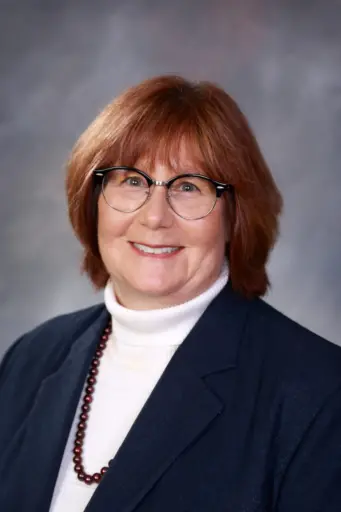
Sharon Farrens
Director of Process Integration,
Quora Technology Inc.
MSNE ’83, MSMatSci ’85, PhDMatSci ’89
(BS physics ’81, Nebraska Wesleyan University)
Each year, the College of Engineering recognizes outstanding alumni during Engineers’ Day—a celebration of engineers, held on Homecoming weekend. Shari was among 10 engineers to receive awards in 2017 at an Oct. 20 banquet.
We are honoring her for pioneering significant innovations in wafer bonding and advanced packaging technologies that are critical processing steps in semiconductor device manufacturing.
Recently, we chatted with Shari about everything from her memories as a student at UW-Madison to her career and her family. Here are her responses to some of our questions.
Why did you choose nuclear engineering?
My undergraduate degree was in physics and I wanted to do something more applied. I was especially attracted to particle physics. I had done an undergraduate thesis on neutron activation analysis of meteorite samples, which piqued my interest in areas of nuclear science. That emerged into a desire to work in the nuclear engineering field.
Who was your favorite engineering professor?
All my professors were extremely, totally, magnificently awesome! Picking a favorite is difficult. Professor Barschall was an emeritus professor in nuclear engineering and had worked on the Manhattan Project. His wisdom and mastery of the field was amazing, and learning from his historic insight was a once-in-a-lifetime opportunity for me. Wilhelm Wolfer, whose confidence in my abilities picked me up after I failed to qualify for the PhD program in nuclear engineering, enabled me to continue my studies and achieve my PhD. He was correct that we just need to believe in ourselves and find our niche. And my PhD advisor, John Perepezko, whose true love of metallurgy, professionalism, personal integrity, and insistence on excellence prepared me well for the fabulous career I have enjoyed over these last 28 years.
What’s your fondest memory of your time on campus?
Wisconsin football games were hands-down my favorite. With the band and all the tradition and the dancing, what’s not to love? Other times of year I enjoyed hockey games and the Memorial Union.
What did you learn as a student that has benefited you most in your career?
Professor Kulcinski taught me that having quality presentation materials is essential. Professor Wolfer taught me confidence. Professor Perepezko taught me that both positive, as well as negative, experimental results are valuable. Altogether, I learned to be professional, well prepared, and not give up.
What professional accomplishment makes you most proud?
Seeing my own PhD student be successful, as well as seeing the equipment and process that I co-invented with my student become a worldwide success used in many Fortune 500 companies. We had been told it couldn’t be done. We actually patented the equipment ourselves and then we sold it to my first startup company.
What advice would you give students in your discipline today?
I will use the same quote I used on my PhD thesis, “No matter where you go, there you are.” It’s from the movie Buckaroo Bonzai and, to me, it means that you can succeed anywhere, regardless of where you start.
Is there anything else you’d like to tell us about yourself?
I want to live to be 105 years old (my grandmother set the record at 94 so far) and see how much the new generations of engineers can do. I hope it will be to extend quality of life, stave off geopolitical conflicts, and lead to more spare time. It’s hard for me to be serious and I prefer to make fun of myself and laugh a lot. I have two daughters who are the center of my world.